新编英语教程第三册修订版unit1
- 格式:ppt
- 大小:11.63 MB
- 文档页数:40
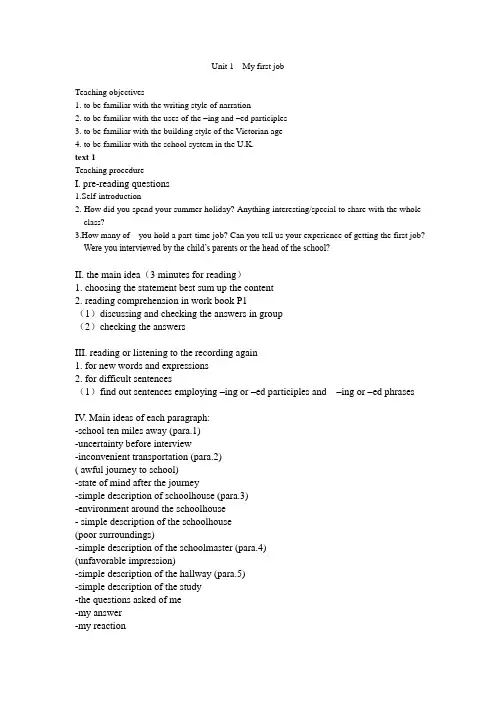
Unit 1 My first jobTeaching objectives1. to be familiar with the writing style of narration2. to be familiar with the uses of the –ing and –ed participles3. to be familiar with the building style of the Victorian age4. to be familiar with the school system in the U.K.text 1Teaching procedureI. pre-reading questions1.Self-introduction2. How did you spend your summer holiday? Anything interesting/special to share with the whole class?3.How many of you hold a part-time job? Can you tell us your experience of getting the first job? Were you interviewed by the child’s parents or the head of the school?II. the main idea(3 minutes for reading)1. choosing the statement best sum up the content2. reading comprehension in work book P1(1)discussing and checking the answers in group(2)checking the answersIII. reading or listening to the recording again1. for new words and expressions2. for difficult sentences(1)find out sentences employing –ing or –ed participles and –ing or –ed phrasesIV.Main ideas of each paragraph:-school ten miles away (para.1)-uncertainty before interview-inconvenient transportation (para.2)( awful journey to school)-state of mind after the journey-simple description of schoolhouse (para.3)-environment around the schoolhouse- simple description of the schoolhouse(poor surroundings)-simple description of the schoolmaster (para.4)(unfavorable impression)-simple description of the hallway (para.5)-simple description of the study-the questions asked of me-my answer-my reaction-the pupils at the school (para.6)--terrible teaching program/set-up-my responsibilities (para.7)-my annoyance (para.8)(meager salary)-the last straw (para.9)(working under a woman)V.analysis of the textParagraph 1Q1: Why did the author apply for the job?1. a teaching post …: 宾语后置(postponement, 强调)New information, key partsand long or complicated information are often put at the end of the sentence. ·We heard from his own lips the story of how he had been caught in a trap for days without food.2. teaching post: -ing participle modifying “post”3. advised at a school: -ed participle, function as object complement4. being very short of money: adverbial(reason)→adverbial clause of cause or reasonAs I was short of money and w anted to do something useful,…Being in poor health and lacking in teaching experience, he was dismissed.Not having his telephone number, I couldn’t ring him back.5. experience of teaching: gerund = teaching experience: -ing participle6.chances of landing the job: gerund, there is little possibility of7. short of: short of1) having an inadequate supply of: …供给不够的:We're short of cash. 我们现在现金不足。
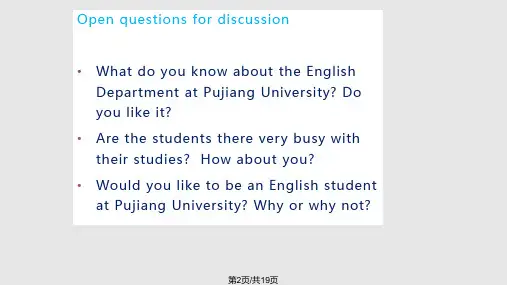
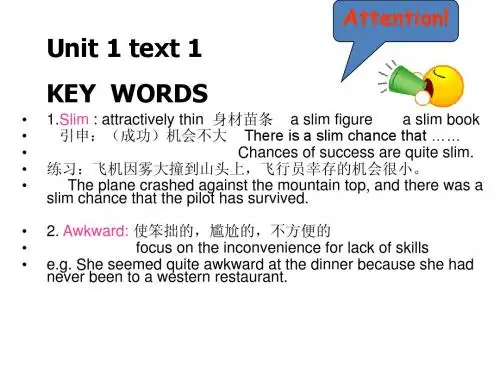
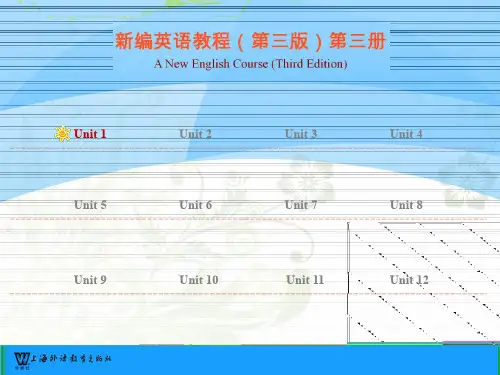
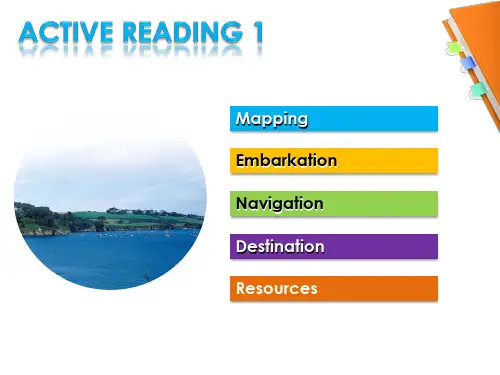
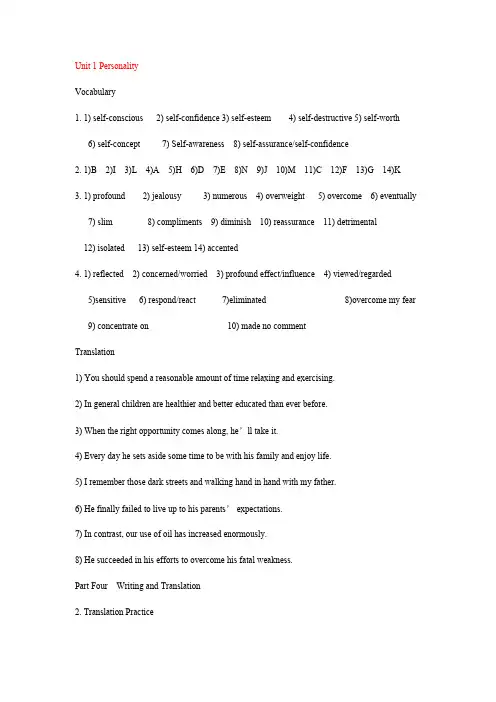
Unit 1 PersonalityVocabulary1. 1) self-conscious 2) self-confidence 3) self-esteem 4) self-destructive 5) self-worth6) self-concept 7) Self-awareness 8) self-assurance/self-confidence2. 1)B 2)I 3)L 4)A 5)H 6)D 7)E 8)N 9)J 10)M 11)C 12)F 13)G 14)K3. 1) profound 2) jealousy 3) numerous 4) overweight 5) overcome 6) eventually7) slim 8) compliments 9) diminish 10) reassurance 11) detrimental12) isolated 13) self-esteem 14) accented4. 1) reflected 2) concerned/worried 3) profound effect/influence 4) viewed/regarded5)sensitive 6) respond/react 7)eliminated 8)overcome my fear9) concentrate on 10) made no commentTranslation1) You should spend a reasonable amount of time relaxing and exercising.2) In general children are healthier and better educated than ever before.3) When the right opportunity comes along, he’ll take it.4) Every day he sets aside some time to be with his family and enjoy life.5) I remember those dark streets and walking hand in hand with my father.6) He finally failed to live up to his parents’ expectations.7) In contrast, our use of oil has increased enormously.8) He succeeded in his efforts to overcome his fatal weakness.Part Four Writing and Translation2. Translation Practice1) It is believed that pessimism often leads to hopelessness, sickness and failure.2) Optimism, by contrast, can make you happy, healthy and successful.3) When you fail in something, profit from the failure as a learning experience.4) Think about your strengths and build up self-confidence in front of problems or difficulties.5) Don’t let negative thoughts hold you back.6) Everyone has experienced failures and disappointments, so don’t blame yourself too much.Unit 2 Myths and LegendsVocabulary1. 1) A. invitation B. invited C. inviting 2) A. prepare B. prepared C. preparation D. preparatory/preparation3) A. discoveries B. discoverers C. discovered4) A. approval B. approve C. approved D. approving E. disapprove5) A. eloquent B. eloquence C. eloquently6) A. faithful B. unfaithful/faithless C. faith d. faithfully7) A. occasional B. occasionally C. occasion8) A. delivery B. delivering C. delivered9) A. troublesome B. troubled C. troubled D. troubling 10) A. assurance B. assured C. assure2. 1) got/ran into trouble 2) no trouble 3) asking for trouble 4) have … trouble 5) troublewith6) in serious/deep/big trouble 7) get/getting … into trouble 8) took the trouble3. 1) with a pattern of roses 2) prepared a wonderful/goof meal for us3) promised faithfully 4) deliver this letter5) a selection of milk and plain chocolate 6) keep out of mischief/behave themselves7) the sound of distant thunder 8) received approval from the government9) in spite of the fact that he drank too much 10) agree whether the drug is safe or notPart Three Further Development5. Complete the following Ancient Chinese story by translating the Chinese into English1) the true reason why there was no such animal in Guizhou2) they were of no use at all in this place3) when he saw the donkey all of a sudden, he thought it was a monster4) he hid himself in the trees while looking at the donkey5) what kind of animal is this and why does it look different from other animals that I’ve seen?6) But one day the donkey stretched its thin neck and cried7) the tiger discovered that the donkey didn’t have any other skills besides crying8) But he dared not rush to it and eat it just as he did to other animals9) This did irritate the donkey (made the donkey angry), who raised its hind leg and kicked the tiger10) This time he rushed to it without hesitation and bit its rhroatPart Four Writing and Translation2. Translation Practice万物之初 天地还是一体 充满混沌。
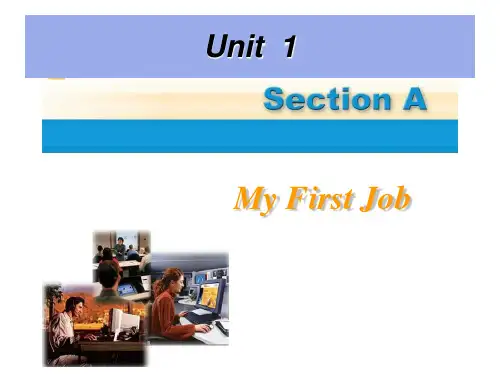


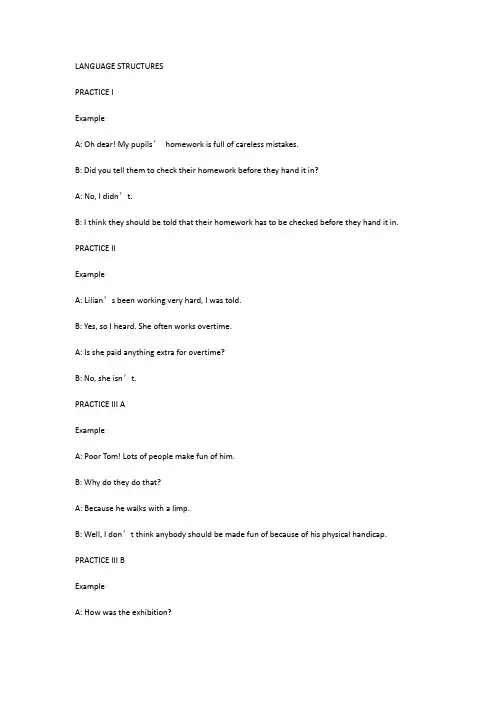
LANGUAGE STRUCTURESPRACTICE IExampleA: Oh dear! My pupils’homework is full of careless mistakes.B: Did you tell them to check their homework before they hand it in?A: No, I didn’t.B: I think they should be told that their homework has to be checked before they hand it in. PRACTICE IIExampleA: Lilian’s been working very hard, I was told.B: Yes, so I heard. She often works overtime.A: Is she paid anything extra for overtime?B: No, she isn’t.PRACTICE III AExampleA: Poor Tom! Lots of people make fun of him.B: Why do they do that?A: Because he walks with a limp.B: Well, I don’t think anybody should be made fun of because of his physical handicap. PRACTICE III BExampleA: How was the exhibition?B: Very good.A: Were brochures handed out to visitors?B: Oh, yes, they were.PRACTICE IVExampleA: People say the city has mapped out a construction plan for the next year.B: Has it? Do you know any particulars?A: Yes. They say that three parks will be expanded.B: Good. We’ll have more space for enjoyment and rest.DIALOGUEThe Olympic GamesA: Hi, Mark!B: Hi, Jessie, nice to see you! Why are you looking so worried?A: I’m writing an essay on the Olympic Games, but, you know, I know very little about them. It is said that you are an Olympic expert, so could you please give me some help?B: No problem! What do you want to know?A: I only know the ancient Olympic Games originated in Athens. Could you tell me something about them?B: Well, the ancient Olympic Games were a series of competitions held between representatives of several Greek city-states and kingdoms, which featured mainly athletic but also combat and chariot racing events.A: I hear the origin of the Olympics is shrouded in mystery and legend.B: It is. One of the most popular myths identifies Heracles and his father Zeus as the progenitors of the Games. According to legend, it was Heracles who first called the Games “Olympic”and established the custom of holding them every four years.A: When were the first Olympic Games held?B: In 776 BC. The Games reached their zenith in the 6th and 5th centuries BC, but then gradually declined after the Roman Empire came to dominate ancient Greece. They were abolished in 393 AD.A: What a pity! When did they begin to revive?B: Not until about 1,500 years later, when a young French educator, Baron Pierre de Coubertin, proposed that the ancient Games be revived on an international scale.A: His attempt at reviving the Games must have been warmly welcomed.B: No. In fact, his attempt was not met with much enthusiasm. Still, he persisted.A: So when and where were the first modern Olympic Games held?B: They were held in Athens in 1896, with 241 athletes from 14 nations competing in 43 events.A: And now the Games have grown to more than 10,000 competitors from over 200 countries. They’ve really developed.B: They have.A: I know the Olympic Games are held in a different city each time. But who is responsible for choosing the host city?B: The International Olympic Committee is responsible for that, as well as overseeing the planning of the Olympic Games, and updating and approving the sports program.A: You really do know a lot about the Olympic Games. Thank you so much for your help!B: It’s a pleasure.LISTENING IN & SPEAKING OUTPopular Sports in BritainSports play an important part in the life in Britain and they are popular leisure activities.Whether spectating or participating, British people are well-known for their love of sports.Wherever you are, you’re never far from the action and the options are huge. There’s a non-stop calendar of events with many sports played in summer or winter. It’s no wonder manyBritish people think in sporting seasons rather than years.The United Kingdom has given birth to a range of major international sports including: football, rugby, cricket, golf, tennis, badminton, squash, hockey, boxing, snooker, billiards and curling. It has also played a key role in the development of sports such as Sailing and Formula One.Football is undoubtedly the most popular sport in England, and has been played for hundreds of years. In the English Football League there are 92 professional clubs. These are semi-professional, so most players have other full-time jobs. Hundreds of thousands of people also play football in parks and playgrounds just for fun. The highlight of the English football year is the FA (Football Association) Cup Final each May. The beautiful game is not only a sport in Britain but a way of life. Players like England ace David Beckham have turned heads all over the world and made teams like Manchester United and Arsenal household names.Rugby is similar to football, but played with an oval ball. Players can carry the ball and tackle each other. The best rugby teams compete in the Super League Final each September. For many years rugby was only played by the rich upper classes, but now it is popular all over the country.The world’s most famous tennis tournament is Wimbledon. It started at a small club in south London in the 19th century. It begins on the nearest Monday to June 22, at a time when the English often have the finest weather. Millions of people watch the Championships on TV live. It is traditional for visitors to eat strawberries and cream whilst they watch the tennis.Horse racing, the sport of kings, is a very popular sport with meetings being held every day throughout the year. The Derby originated here, as did The Grand National which is the hardest horse race in the world. Horse racing and greyhound racing are popular spectator sports. People can place bets on the races at legal off-track betting shops.READING ITwo Kinds of FootballAmerican football, not to be confused with the football called soccer, is the American national sport. It developed from the British game of rugby and, although it is played in no other country in the world (except Canada), it excites tremendous enthusiasm. Intercollegiate games (games between universities) are great social occasions. More than 100,000 mothers and fathers, brothers and sisters, students and football fans from the general public, crowd into the huge, luxurious stadiums. During a recent college final in the Rose Bowl at Pasadena, California, there were severe earthquake tremors, but nobody noticed!The method of scoring in American football is the same as in rugby. Players try to carry the ball over the opponents’line, and then to earn more points by kicking the ball between the upright goal posts above the bar. But that is where the likeness between the two games ends.American football has a reputation for being a brutal and dangerous game. This reputation is not really deserved. The players hurl themselves at each other fiercely, but today their uniforms and helmets (fitted with visors to protect their faces) are so skilfully padded that there are few serious injuries. By comparison, the rugby player is almost naked, having only a thin jersey and a pair of shorts to protect him from his opponents’boots and tackling.The Americans are addicted to crazes. When they take something up, they do so wholeheartedly, and often the rest of the world follows their lead. Jogging is an example of this. The Americans now have another craze, a game which most other countries call “football,”but which they call soccer. Soccer is spreading like wildfire through all the States and gaining in popularity on baseball. It is being run by big business and TV advertisers, who are doing everything they can to sell it to the public. They are employing famous fashion designers to design novel uniforms for the players. They have introduced a musical background to the games, and there is a big screen in the stadium which explains to spectators what is happening. Most important, they have hired, at enormous expense, famous coaches and players from Europe and South America. They have also changed some of the rules, including the offside rules to make the game more exciting.Soccer games can now draw crowds of over 70,000 in cities where baseball attracts a mere20,000 spectators. The soccer stadiums are much more luxurious than the vast majority of European and South American league grounds. There is a seat for everyone and a parking lot for 25,000 cars.Soccer is being brilliantly promoted, like any other promising American product.READING IIThe Physical Miseducation of a Former Fat BoyWhen I was six, a next-door neighbor gave me my first candy bar, and I fattened immediately in a home where food was love. It is hardly surprising that when I first entered physical education courses in the eighth grade my coaches were markedly unimpressed or that thereafter I compensated by working harder at books, where I was more successful. Although I did learn to take jokes about my size and experienced the “bigness”of being able to laugh at myself (the standard fat man’s reward), at thirty-five I am furious to recall how readily and completely my instructors defaulted in their responsibilities to me. Some remedies I have learned in my thirties persuade me that it is not inevitable that the system will continue to fail other fat boys.My personal remedies for physical ineptitude have a firm base in ideas. Four years ago I weighed 265 pounds. Only my analyst needs to know how much I consequently hated myself. In six months I took off 105 pounds and initiated a regular jogging and exercising schedule that has gradually, very gradually, led to increased self-confidence. Yet my physical education teachers in secondary school and college never showed the least interest in my physical problems, never sat down and initiated the simplest diagnosis of my physical needs, never tempted me into thepersonal discoveries that I have to wait more than a decade to make for myself.Instead, my physical educators offered two alternatives. Either I could enter the fierce competitive sports that predominate in our culture and therein make and accept the highest mark I could achieve; or I could opt for the less-competitive intramurals, modeled after the big boys’games, and accept my role as a physically incompetent human being, sitting on the sidelines to cheer for a chosen team of professionals. These limited alternatives were repeatedly justified as teaching me how it is out in the “real world,”in “the game of life,”allegedly divided between the participators and the watchers.Now, as I jog in my midwinter dawn, all muffled with socks over my hands, making tracks with the rabbits in Carolina dew, I am not competing with anyone, unless I whimsically imagine Father Time having to add another leaf to my book. I am celebrating me, this morning, this pair of wornout tennis shoes, the tingle in my cheeks, the space being cleared in my stomach for my simple breakfast when I get back…I was very articulate at fourteen —fat by articulate —and I believe that a sympathetic, interested coach could have shared this type of insight, this type of reality, with me, and perhaps thereby he could have teased me into the discoveries I had to take many years later.But the coach would have had to love kids like me more than he loved winning if he had hoped to participate in my physical education. I had no such coach.My physical educators were signally unimaginative. We played only the few sports that had always been played in our area. Further, they maintained a rigid separation between “sports”and “play.”Football, baseball, basketball, and track were “sports.”Fishing, hiking, boating, and jogging were “play.”Golf was “play”until you had a team that won five trophies; then you developed the cool rhetoric of “sport.”。
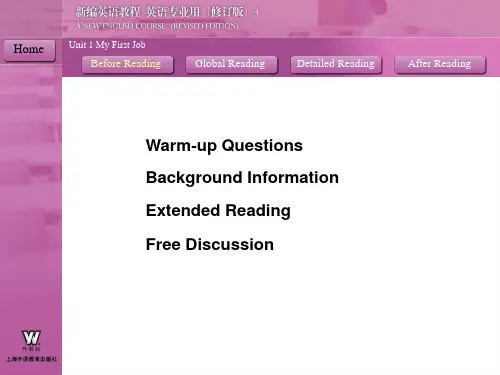
Unit1Working Holiday AbroadKey to ExercisesOpenerGoing on a working holiday has many advantages:•A working holiday visa grants you access to a country for a longer period of time than a standard tourist visa.•The travel is sustainable in the sense that you can keep refilling your travel funds with employment.•You can try different types of jobs,even the ones that you normally wouldn’t do when at home. And in this sense,a working holiday could be a life-changing experience.•You are more likely to meet and make friends with the locals,not just other tourists.They can introduce you to a new culture.•A working holiday makes a good break.A popular time to sign up for a working holiday is the break between high school and college or the break after college and before entering the real working world.Transcript:A working holiday is when you spend a significant amount of time in another country and have the working rights to back it up.You are able to pick up a job or two(or6)and break that arrangement up by traveling or moving on to a new location in the country.In general,a working holiday visa grants you access to a country for a longer period of time than a standard tourist visa.In Australia,for example,the typical tourist visa is for3months while a working holiday visa is for12months.With a working holiday visa,you can work as you go,meaning you won’t necessarily go into debt while spending time abroad.Your method of travel may vary.Some prefer to travelup-front for several months and then spend the rest of the time working in one or two differentlocations.Others prefer to work for a month,travel for a month and then work for a month again. Either way,the travel is sustainable in the sense that you can keep refilling your travel funds with employment.With a working holiday visa,you are basically given the opportunity to test out any type of job,and you are probably put in a position to accept ones that you normally wouldn’t when at home.You never know what you might discover.A working holiday,in this sense,could end up being a life-changing experience.Moreover,by taking up employment in a country abroad,you are more likely to meet and make friends with the locals,not just other tourists,and that can do wonders for really introducing you to a new culture.A working holiday also makes a good break.A popular time to sign up for a working holiday is that break between high school and college or the break after college and before entering the real working ter working holiday experiences are often used by individuals as a way to explore the new and unknown.Taking part in a working holiday is a great idea to consider.Reading&InteractingI.Understanding the Text1.Text OrganizationPart Five Paras.13–14The author would love to live the expat life again somewhere else,although there is also the part of her that would like to settle down for a while.Part Six Para.15The author wants to thank the working holiday for helping her become a better version of herself.prehension Check2.1Digging into detail1.She lost her grandmother,her job and had two car crashes in five months.2.They met up for dinner,ladies night and sightseeing excursions.The author taught herco-workers an Australian word of the day and they helped her understand the Canadian use of “eh”at the end of sentences.3.They listened to90s music,drank their daily Starbucks and served their friendly regulars.4.She loved her job so much that she didn’t feel she was working.5.She did a massive circle,starting from Vancouver,going all the way to the East Coast,then across Southern USA and finally up the West Coast.6.She was proud of herself for constantly stepping out of her comfort zone and embracing the unknown.7.She is obsessed with browsing craft and design blogs and watching the Lifestyle channel.8.Vancouver has helped her to grow personally,have fun professionally and gain confidence.2.2Understanding difficult sentences1.B2.A3.B4.B5.AII.Focusing on Language in Context1.Key Words&Expressions1.11.Accidentally,the whole incident was captured by a young American photographer.2.Those who had been kidnapped described how they were scared and in physical and emotional pain.3.It was not long before help arrived in the form of ten police officers.4.Despite a great deal of practice,Alice remained an awkward dancer.5.A few hours ago,there was a head-on crash on Highway20,involving three cars.6.I am wondering when Tom is going to settle down and get married.7.The event features a large indoor display of local crafts and agricultural products.8.There are some birds nesting in the eaves of our house at the moment.9.A chill ran through me when I heard the terrible news.10.True,Linda makes almost no typing errors,but then she’s very slow.11.It seems like everyone writes a blog these days,or sets up a website that’s used as a personal diary for posting photos and stories.12.I often watch the sports events broadcast on cable networks like ESPN and TNT.13.Michael was always late for class,but that day he,for once,came much earlier than usual.14.During my mother’s last days,I spent many hours by her side,holding her hand.15.They have assigned me the role of a heartless financier,who is obsessed with money,wealth, and luxury.1.21.presently2.alongside3.prior to4.in total5.embrace6.zones7.traded8.meet up9.kind of1.31.My family went on an excursion to a pretty island off the coast.2.Don’t ask your father how to Wechat—he hasn’t got a clue about smart phones.3.You can follow these steps to apply for a visa to travel to the United States.4.These apps have different versions for different types of computers.5.The first step in snakebite treatment is to have the poison sucked out of the wound.age1.The credit card is in my wallet,which you can find in the kitchen cabinet drawer.2.Personal computers,which were actually invented in1964,have come quite a long way.3.My dearest friend ignored my advice,which totally surprised me.4.I went to London with Emily White,who lives next door.5.I lent some money to Jack,whose house was destroyed in the earthquake.6.In the past six years I lived in six different houses,which actually didn’t bother me much.3.Sentence Patterns3.11.Now that you are a grown-up,you should earn a living on your own.2.Now that you are here,you might as well stay for dinner.3.Now that you live only a few blocks from your company,you may walk to work every day.3.21.It was not long before the two companies were able to reach an agreement.2.Mark Zuckerberg worked quite a long time to build Facebook,and it was years before the company made a profit.3.Sometimes you may make very fast progress in a foreign language,but sometimes it is a while before hard work starts to pay off!prehensive Practice4.1ClozePrior to taking a working holiday abroad you will need to do a number of things.There is quite a lot of paperwork to complete.You will need to fill out various forms,including a visa application.Make sure it is the sort that allows you to take employment,rather than just being an ordinary tourist type that allows you to do sightseeing only.Alongside that,of course,you need to book your ticket.Once that is all done you will be ready to set off.Don’t let the thought of stepping outside your comfort zone frighten you,don’t let it stress you out.You may set outon your own,travelling solo,but you will soon make friends with many of the new people you meet on the way.So,start browsing the Internet to see where you would like to start your adventure!4.2TranslationIf you are fully prepared,your working holiday abroad can be one of the most rewarding experiences you can ever have.Here are some tips.First,you need to choose your destination wisely by browsing relevant websites.Then fill out the necessary paperwork,apply for a visa and book your flight as early as possible.Try to learn some new job skills prior to your departure, which can give you more employment options abroad and help you save up enough money for travel.Within weeks of arriving in a foreign country,people often feel stressed out or kind of confused,so be prepared for the emotional stress.Make friends with local people instead of taking the adventure solo.And whenever possible,go on sightseeing excursions and capture the places you visit in words or st,always follow your heart and do what you truly want to do.Reading&Comprehendingprehension Check for Reading11.F2.F3.T4.T5.F6.F7.T8.F9.T10.F2.Translation1.我现在意识到,为了适应每个新角色、在各种行当跟不同的人群一起工作,我学到了很多。
Unit 1Put in Use : Practice 11、are going to apply for a patent on it2、ve you made the necessary preparations3、e model has yet to undergo / receive the final test, but the technical drawings are ready4、w long will it take to get the patentPut in Use : Practice 21、at findings have you got from the market research2、e mini-type of mobile phones are selling well in the market3、you think this new type of mobile phones will take the place of the older ones4、people's living conditions have been improved greatly in recent years5、their views on consumption are also changing rapidly6、So you believe the potential market for mobile phones will be quite large Put in Use : Practice 31、are you interested in2、something about them3、 model do you prefer4、the functions or the price5、show you6、What's your price on that / What's the priceListen and JudgeTFFTTTTFListen and Respond1、In an automobile store2、To give it to his daughter as a birthday gift3、Only one4、About three months5、RMB 208 600 yuan6、In installmentsListen and Read1、Washing2、ten/103、Extremely4、Customers5、fresh smell6、Ingredients7、Larger8、Thicker9、Benefit10、less tired and less sleepyPassage I : Read and Think 1BDDCAPassage I : Read and Think 2 1、Because face-to-face selling can provide immediate feedback which helps salespeople to adapt.2、The purpose is to generate a lot of interest and book sales at no cost to the publisher.3、Because they want to get free publicity for their products.4、He believed that a consumer might not pay any attention to an ad—but might carefully read a long magazine story with the same information.5、Publicity is a very cheap (even free of charge) promotion method, and it might be more effective than paid advertising.Passage I : Read and Complete 11、Scattered2、Convinced3、Generated4、Prompted5、Identify6、Flexible7、Feedback8、Presentation9、Target10、objectivePassage I : Read and Complete 21、Direct2、Combine3、Establish4、Events5、Purchase6、Backgrounds7、Occupations8、Candidate9、Vital10、communicatePassage 1:Read and Translate1、She shopped around till she got what she wanted at a price she could afford.2、He never speaks to me other than to ask for something.3、You should always aim at doing your job well .4、She has been tied to the house for weeks looking after her invalid father.5、The route was designed to relieve traffic congestion.6、Society is made up of a wide variety of people; some are good, others (are) bad, and still others (are) in between.Passage 1:Read and Simulate1、The son was watching DVD at home while the parents were working in the fields.You like sports, while I prefer music.2、The following are three ways a taxpayer may choose from to calculate the tax due on his /her spouse's salary.There are so many different CD versions to choose from and I have no idea which is the best.3、The old man would sit on a bench in the quiet park and look at others for hours without doing anything or talking to anybody.The researchers have concluded that drinking tea does good to the health of people without examining any other factors.4、In such an urgent situation, the focus of our investment should be on new machinery rather than building.I always prefer starting early, rather than leaving everything to the last minute.5、There's nothing on TV tonight, other than rubbish.Because the bridge collapsed last month, you can't get across other than by swimming.Passage II : Read and Judge TFTTTTFFFTPassage II : Read and Translate 1、It has become a very common but very annoying practice to promote a new product on television.2、On Christmas Day, New Century Department Store gave away a smallbox of chocolate to every customer who shopped there.3、After waiting for a long time, we finally saw the President show up on the platform.4、Telephone booths placed one after another along the streets is the symbol of civilization and a beautiful view of the city as well.5、The spaceships manned by Chinese have witnessed two successful outer space missions.6、Even today, I still remember clearly what the old headmaster said at our graduation ceremony.Applied Writing : Simulate and Create 1Applied Writing : Simulate and Create 21、made in 2、traditional product 3、famous brand4、Manufactured 5、special and tasty 6、a high reputation7、Health Food 8、the best seller 9、awards and medals10、the dried beefUnit 2Put in Use : Practice 11、Founded2、Employees3、Products4、Annual production / output5、Developing6、R&DPut in Use : Practice 21、We have been dealing in importing automobiles.2、We have three branches in China.3、It's in Toronto.4、They were about 180 million yuan.5、It's about ten percent.Listen and Complete1、19822、Stock3、Shanghai4、Hong Kong5、Tokyo6、mobile telephones7、digital cameras8、Sales9、200 00010、$80 000 000Listen and DecideDAACBListen and Read1、the 21st century2、Tokyo, JAPAN3、President and CEO4、June 17, 19375、135.3 billion yen6、21 6717、Software8、Communications SystemsPassage I : Read and Think 1 BCACDPassage I : Read and Think 21、Maintain market alertness2、Employee equal opportunity3、Excellent working conditions4、Produce outstanding quality5、market standard6、distribution channels7、Haier innovation8、Slack season9、Flexible strategies10、Goal of complete customer satisfaction Passage I : Read and Complete 11、Advancement2、Conservative3、Reflected4、Significance5、Distinctive6、Innovating7、had established8、Recognized9、PositivelyPassage I : Read and Complete 21、Referred2、Marketing3、Release4、Originally5、Introduction6、Differed7、Reputation8、Revolutionized9、Innovative10、AvailablePassage I : Read and Translate1、How do you account for the fact that you've been late every day this week?2、The government has committed itself to improving the life conditions of the people living in the underdeveloped areas.3、According to the latest report, the train accident resulted in the death of several pasengers.Plenty of fresh air contributes to good health.4、He attempted to compete for the position of chairman of the Students' Union, but he didn't get in / succeed.5、Throughout one-year industrious work, the company has achieved all its goals this year.Passage I : Read and Simulate 1、In a way, I'm glad you made that mistake, for it will serve as warning toyou.My suggestion is that you should buy that multifunctional sofa because it may serve as a bed.2、This school began as a community college and has grown to one of the most famous universities in the state.Columbia began as a family owned hat distributorship in 1938, and has grown into one of the world's largest outerwear brands.3、Our mission is to be one of the leaders in performance running and one of the most admired.The commitment of our company is to introduce the products of our country to the customers throughout the world.4、Luxury is becoming a concept rooted in our modern drive to find personal meaning and satisfaction.In history, "value" is itself a human concept rooted in rational and moral principles.5、Our president encourages us to improve ourselves by reading an hour a day in our fields.According to a new research, smokers can reduce their risk for heart disease by cutting down on smoking cigarettes.Passage II : Read and Judge FFTTFFTTTFPassage II : Read and Complete1、19182、19633、5 0004、Nine5、19656、one million dollars7、2008、19859、Twenty-Five10、thirty five thousand11、one billion12、eight hundred thousandPassage II : Read and Translate1、This method has proved to be very successful.2、We won't know the worth of health until we are ill.3、This kind of performance was very popular with college students.4、It is recognized that smoking is bad to one's health.5、The best way to learn something is to do it.6、They will compete with swimmers from across the world.7、We can't solve all the problems, but we certainly can ease their suffering.8、I had a lot of fun that evening and so did everyone else at the party. Applied Writing : Read and Complete1、Spring Inc2、New York City3、four / 44、150%5、men's casual sportswear6、ServicesApplied Writing : Simulate and Create 11、was established2、specialize in3、annual sales4、is growing steadily5、Branches6、With7、serve the needs8、further develop9、deal with10、doing businessUnit 3Put in Use : Practice 11、Certainly. Here's the catalogue for some of our popular items.2、Thanks. We'll look into it carefully.3、We have a steady supply for most of them.4、We usually quote on a CIF basis.5、You'll find our prices very attractive.Put in Use : Practice 21、Fine2、have / take3、If4、For5、Long6、For7、Changes8、OutListen and JudgeTTFTFFFListen and Respond1、In HK dollars.2、The seller will reduce the total payment by one percent.3、$405 per unit.4、Because that is the standard practice on the FOB basis.5、The buyer.6、No, not yet.Listen and Read1、November2、Delivery3、Able4、Type5、Demand6、Month7、January8、Customers9、Models10、CarryPassage I : Read and Think DACCAPassage I : Read and Complete 11、purchased goods online2、eBay3、ISP4、user account names Passwords5、Failed6、Danger7、CarefulPassage I : Read and Complete 21、Denied2、Partly3、had risked4、Removed5、Failed6、Disaster7、Assumed8、Discourage9、Registered10、ResidentsPassage I : Read and Complete 31、Need2、Through3、See4、With5、Process6、Whom7、Party8、Another9、Not10、AboutPassage I : Read and Translate1、The thieves made off with a large sum of money from the bank.2、High blood pressure places millions of people at the risk of heart disease.3、Think twice before you make any important decisions.4、A large part of the African continent is in danger of becoming a desert.5、Not once has he suggested a good way to deal with any problem. Passage I : Read and Simulate1、If there is a problem, we never point fingers at each other.They pointed fingers at one another for failing to prevent the disaster.2、It is highly unlikely that this problem will be solved in the near future.It was highly unlikely that she would do that kind of thing.3、This computer virus is spreading, and all online users are at risk.The economy is very depressed at the moment, which puts more jobs at risk.4、I advised him to think twice before deciding to quit school.Always think twice before paying out large sums of money.5、Could it be that more people will ride bikes to work?Could it be that I was too close to the situation to see it clearly?Passage II : Read and Judge TFTTTFFFPassage II : Read and Rewrite1、40% of all Canadians have access to the Internet2、The Internet is a universal information system3、Access to "the web" is easy4、obtain information5、set up a website of your own6、expand your business7、settle payment by credit cardtApplied Writing : Simulate and Create 1Applied Writing : Simulate and Create 2June 26, 2003Bank of China, ShanghaiSmith and Sons Co., Ltd. Southampton, EnglandShanghai Zhongnan Import and Export Corporation, Shanghai, ChinaOne Hundred And Fifteen Thousand US Dollars (US$ 115 000.00) August 26, 2003Bank of China, Shanghaiat sight1、commercial invoice five (5) DEF—101 June 3, 20032、Packing list five (5) Cotton Grade A, 100 Tons (CIF Southampton)3、Clean "On Board", "Freight Prepaid" Bill of Lading4、Insurance certificateShanghai, ChinaSouthampton, EnglandProhibitedPermittedUnit 4Put in Use : Practice 11、hire more people2、who will train and supervise the new employees we hire3、Normally, it takes three weeks to train an employee before he can work4、on his ownT5、he training sessions are too long6、But the new employees don't know anything about the computer and it7、also takes time to train them to use the computer8、That way you can cut down the training timePut in Use : Practice 21、mainly on fire prevention and office safety2、and controlled by the automatic sprinkler system3、I'll show you around after the talk4、one at either end of the corridor on each floor5、You can dial the emergency number on the telephone set thereListen and DecodeTFTFTListen and Respond1、From next Monday on.2、About the office rules.3、One should be quite familiar with office routines and try to do everything well.4、Keeping things in order.5、Be careful not to throw things about.Listen and Read1、Introduce2、Information3、Enable4、Acquire5、Planned6、Trainees7、Leave8、Designed9、Combine10、QualifiedPassage I : Read and Think 1 DDCCAPassage I : Read and Think 2 TTFTFFPassage I : Read and Complete 11、Perspective2、Assigned3、Revealed4、Insight5、Unintended6、Contrast7、Startled8、Perform9、feel like10、serving asPassage I : Read and Complete 21、Employees2、is concerned with3、Operate4、Responsive5、calls for6、Employers7、turn out8、On the other hand9、no denying10、MeansPassage I : Read and Translate1、In cultural exchanges, misunderstanding is often unavoidable.2、In my few years of study in Britain, I had chances to meet students of all sorts of nationalities.3、In Western countries, it is a common way for students to send Christmas cards to teachers to show their respect.4、My teacher looked at me, with a puzzled expression on the face.5、We are all aware that competition in the market is very fierce.6、When some Chinese idioms are translated into English, their meanings may startle some readers of English.Passage I : Read and Simulate 1、He seems to know the way better than I do.His voice seemed to have disturbed her.2、His carelessness led to this accident.Hard work leads to success.3、I was assigned to a small room when I started my work in the college.Each of us was assigned to a holiday homework by the teacher.4、Don’t leave until I arrive.I won’t stop shouting until you let me go.5、My eyes were irritated by the smoke.The boss was irritated by the clerk’s rude behavior.6、When it came to his turn, he rose from his seat.When it comes to drawing a plan, leave it to me.7、Instead of improving, he is getting worse.They built a reservoir half way up the mountain instead of at the top.Passage II : Read and Judge CCABDPassage II : Read and Rewrite1、manage2、Pertaining3、Need4、Require5、Competitive6、Technology7、Necessary8、change or learnPassage II : Read and Translate1、We are sorry, but this vacancy has already been filled.2、We have now entered the information age and left behind the industrial age.3、The rapid change of the global economy calls for college students to master the latest technology.4、We must try our best to develop ourselves to meet the needs of the new situation.5、It should be admitted that really qualified college teachers are hard to find.6、Prevention of disaster and terrorism requires a new set of management skills.Applied Writing : Read and Judge FTFTFApplied Writing : Simulate and Create 11、have a training program2、conduct the new sales representative training program3、seek his advice and past experience4、searching for an outside trainer5、enjoys a good reputation in Asia6、may review the materials with the consulting firm7、what sort of training content we expectUnit 5Put in Use : Practice 11、the headline of the advertisement for our computers2、the headline is more important than the body3、What do you think of this headline4、it's a little too plain5、Shall we discuss the body of the advertisement firstPut in Use : Practice 21、We mainly deal with outdoor advertising.2、The choice of an advertising place depends on how much you are prepared to pay.3、Yes, but it can make your product widely known.Listen and Complete1、Media World2、Night and Day Advertising company3、Copywriters4、people don't work long in advertising5、safer than in advertisingListen and Decide1、Five years ago.2、About three years ago.3、She works closely with the clients and advertisement writers and works out advertising strategies with them.4、Below 30.5、Yes, there are also a lot of older people in it.Listen and Read1、American citizen2、nearly $ 3703、Argue4、Services5、Purchasing6、larger quantities7、in turnPassage I : Read and Think 1CDCACPassage I : Read and Think 21、Female2、New York City3、Married4、the World's Fair5、Top 10 advertisinPassage I : Read and Complete 11、soared2、Milestone3、Commercial4、Nutrition5、Amused6、Charming7、Icon8、Presented9、Romantic10、SymbolizesPassage I : Read and Complete 21、Pleasuret2、Icon3、Industry4、Appearance5、Consumers6、Commercials7、Campaign8、Launch9、Extend10、AccomplishmentPassage I : Read and Translate1、Last semester, Wang Gang was awarded the title of an Outstanding Student for his excellent performance.2、On Teachers' Day, the students made a greeting card for their teacher, which symbolized their appreciation of what the teacher had accomplished in the past year.3、The children were amused by the story about the cat.4、The continual sunny days made the temperature soar sharply.5、Walking after supper promotes digestion.Passage I : Read and Simulate1、What people admire about Lei Feng is his selflessness.What we lack currently is credibility.2、Since the Bulls won their third championship, Michael Jordan has been synonymous with the NBA.Since his story was publicized, Kong Fansen has almost been synonymous with the outstanding Party member.3、His misery in life began when he first tried the drugs.His romantic life began when he first touched a painting brush.4、The film was so wonderful that I wanted to enjoy it again.We were so attracted by his description that we were planning to travel on Lijiang.5、Even today, a bunch of roses symbolizes love.Even today, war symbolizes destruction.Passage II : Read and JudgeFFFTTTFFPassage II : Read and Translate1、This kind of bed can be assembled easily with a screwdriver.2、She embodies all the best qualities of a doctor.3、Where are your so-called intimate friends when you are confronted with difficulties.4、The manufacturer-recommended retail price for the pens is 18 yuan a piece and the wholesale price is 12 yuan each.5、Although they are brothers, their personalities are quite distinct.Applied Writing : Simulate and Create 1DCDABApplied Writing : Simulate and Create 21、Non-Smoking M2、Reasonable rates3、No Job too BIG or too Small4、NANNY for downtown familyUnit 6Put in Use : Practice 11、I've been asked to come to investigate the damage to the load which this lorry was carrying2、It's your firm which is making the claim. Am I right3、I think these desks could be repainted4、We'll never be able to repair them5、They must have been under water for some time6、Your company should file a formal claim with this report and your policy within 14 daysPut in Use : Practice 21、That would save us a lot of trouble and time2、You cover WPA and War Risks, don't you3、do you cover risks other than WPA and War Risks4、then don't bother. I was merely enquiring5、Thus the premium for the difference between 130% and 110% of the invoice value should6、be borne by the buyersListen and Complete1、an insurance company2、personal insurance3、liability insurance4、profit loss insurance5、Profit loss6、property insuranceListen and DecideCBACDListen and Read1、any insurance2、the coverage3、Insure4、Most often5、rely on6、Sells7、Represent8、Offer9、Shopping10、languagePassage I : Read and ThinkBDACBDPassage I : Read and Match5 7 1 8 4 2 9 36 11 10Passage I : Read and Complete 11、provided2、Leveled3、on a large scale4、results in5、Financial6、Damaged7、States8、resulted from9、guard against10、entered intoPassage I : Read and Complete 2ACCBD BCCBDPassage I : Read and Translate1、These companies entered into a new agreement.2、A company has been set up to produce mobile phones on a large scale.3、This accident resulted in the death of 2 passengers.4、We'd better insure the house against fire.5、Any damage resulting from negligence must be paid for by the borrower. Passage I : Read and Simulate1、The best way to guard against tooth decay is through brushing teeth every day.The best way to guard against infection is through vaccination.2、The purpose of the book is to introduce the basic knowledge of engineering.The purpose of the competition is to provide university students with astage to demonstrate their skills and knowledge.3、This is possible only when the wheels stop turning.This is possible only when the weather is fine.4、In terms of economy, nations can be divided into two groups: developed countries and developing countries.The pie can be divided into five pieces so that everyone gets piece.5、We should try our best to reduce the mistakes resulting from carelessness.They are assessing the loss resulting from the air crash.Passage II : Read and Judge 1 FFFTTTFTPassage II : Read and RewriteInsuranceAdoptClaimRequiredInformrefused / disclaimedCourtPassage II : Read and Translate 1、He has been working hard to maintain his family.2、I want a specific answer to the question I asked you yesterday.3、He put his books on the shelf in order.4、Many cities in China have to rely on the Yangtze River for water supply.5、Are you eligible to join this club?6、We used to cook on coal, but we've now switched to gas.Applied Writing : Read and Simulate 2FTFTTTApplied Writing : Read and Complete1、ship consignments of cameras to Australia2、you can issue an all-risks policy for these shipments3、you can issue a special rate4、regular monthly shipments5、We look forward to hearing from you very soon。
新编英语教程第三册第三版件介绍本文档是关于新编英语教程第三册第三版件的详细说明。
这个版本是在原版的基础上进行了修订和补充,旨在更好地满足学生的英语学习需求。
本文档将逐步介绍本版件的特点、内容结构以及使用建议。
版本特点1. 更新内容新编英语教程第三册第三版件主要在以下几个方面进行了更新:•单词表:修订了原版中一些过时和不常用的词汇,并增加了一些近年来常用的新词汇。
•语法练习:增加了更多实用的语法练习,帮助学生巩固所学的语法知识。
•阅读材料:增加了更多有趣和实用的阅读材料,帮助学生提高阅读理解能力。
•听力材料:增加了更多地道的英语听力材料,帮助学生提高听力理解能力。
2. 教材结构新编英语教程第三册第三版件的教材结构如下:•Unit 1:介绍一些日常生活中常用的词汇和表达方式。
•Unit 2:讲解一些与工作和职业有关的话题。
•Unit 3:介绍一些关于环境和可持续发展的词汇和知识。
•Unit 4:讲解一些关于文化和传统的话题。
•Unit 5:介绍一些关于科技和创新的词汇和知识。
•Unit 6:讲解一些与健康和生活方式有关的话题。
•Unit 7:介绍一些关于教育和学习的词汇和知识。
•Unit 8:讲解一些与旅行和交通有关的话题。
每个单元都包含了词汇、语法、听力、阅读和写作的练习,帮助学生全面提高英语能力。
使用建议1. 阅读顺序建议按照教材自身的结构进行阅读,逐单元进行学习。
每个单元的内容都是有一定逻辑关系的,按部就班地学习,能更好地理解和掌握知识。
2. 多练习在学习过程中,要多进行词汇、语法、听力、阅读和写作的练习。
通过练习能够更好地巩固所学的知识和技能。
3. 制定学习计划制定一个合理的学习计划,安排每天一定的学习时间。
坚持学习和练习,才能够取得良好的学习效果。
4. 寻找学习资源除了教材本身提供的练习题以外,还可以寻找其他相关的学习资源,比如网上的课程、听力材料、阅读材料等等。
多样化的学习资源有助于提高学习效果。